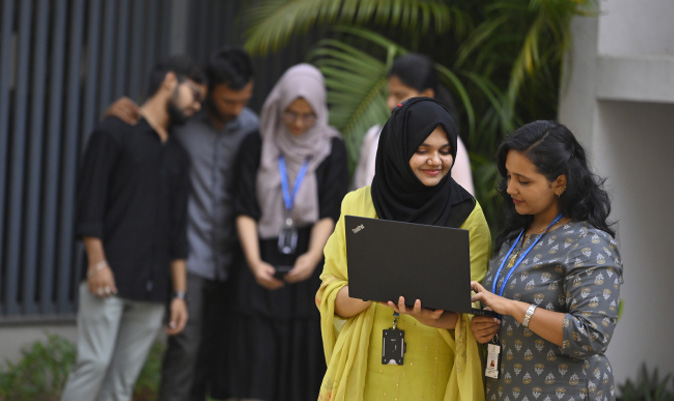B.Sc. Program
Programme Introduction
The B.Sc Forensic Science program with a Minor in Cyber Forensics offers a comprehensive education that immerses students in the core principles of criminalistics within a dynamic and enriching academic environment. The curriculum integrates didactic learning with vocational and practical approaches, ensuring that students develop a deep understanding of forensic science while also gaining specialized skills in cyber forensics. This program is designed to elevate students to the highest levels of intellectual achievement and personal growth, equipping them to conduct impactful research that advances the field and contributes to the development of innovative forensic techniques. Graduates are prepared to join a community of ethical and skilled professionals dedicated to upholding justice and serving society through their expertise in forensic science and cyber forensics.

Eligibility
- A candidate who has passed the two years of Science Pre-University Examination conducted by the Pre-University Education Board in the State of Karnataka or any other examination considered as equivalent with a minimum of 50% marks is eligible for admission to this programme. This eligibility criterion is specifically applicable only to students from the Science stream, ensuring that the foundational knowledge necessary
Programme Outcomes (PO)

- Basic & Discipline specific knowledge: Apply the knowledge of basic and applied sciences, social sciences and arts in various forensic problems.
- Problem Analysis: Identify and analyze forensic problems using field specific Standard methods based on scientific approach. Conduct experiments and simulations, as well as critically analyzing the results and interpret them.
- Modern tool usage: Application of appropriate techniques, instrumentation and modern resources with an understanding of its utility and limitations.
- Ethics: Apply ethical principles and commit to professional ethics and responsibilities and norms of the forensic practices.
- Effective Communication: Develop personal strengths like emphasizing, perseverance, building negotiation skills and communication skills as a team member or team leader.
- Forensic practices for society and criminal justice setup: Understand and analyze the impact of forensic solutions to the society and criminal justice setup.
- Research: Develop a research culture and implementation of the policies to tackle the burning issues at global level and enhance the scientific temper.
- Individual and team work: Function effectively as an individual, and as a member or leader in diverse teams, and in a multidisciplinary setting.
Career Prospects
- Forensic Scientist: Works in forensic laboratories analyzing physical evidence.
- Crime Scene Investigator: Collects and processes evidence from crime scenes.
- Forensic Toxicologist: Analyzes biological samples for toxins, drugs, and poisons.
- Forensic Biologist: Examines DNA, blood, and other biological evidence.
- Fraud Investigator in Banks & Financial Institutions: Detects financial fraud and cybercrimes.
- Risk Analyst in Insurance Companies: Investigates fraudulent claims.
- Private Forensic Consultant: Offers forensic services for private cases.
- Cyber Security Expert in IT Firms: Secures company networks and systems.
- Forensic Auditor: Investigates financial crimes like money laundering.
- Forensic Expert in Police Departments: Works with law enforcement agencies.
- Forensic Analyst in Intelligence Agencies: Works with CBI, FBI, NIA, or Interpol.
- Cyber Forensics Specialist in Law Enforcement: Tracks cybercriminals for government agencies.
- Forensic Consultant in Judiciary: Assists courts in forensic case analysis.
- Customs & Border Protection Forensic Analyst: Investigates smuggling and document fraud.
- Digital Forensic Analyst: Investigates cybercrimes and recovers digital evidence.
- Cyber Crime Investigator: Works with law enforcement to track cybercriminals.
- Ethical Hacker / Penetration Tester: Tests security systems to prevent cyber-attacks.
- Incident Responder: Handles cybersecurity breaches and attacks.
- Malware Analyst: Studies viruses and other malicious software.
- Forensic Data Analyst: Recovers and interprets data from digital devices.
- Information Security Analyst: Protects systems and data from cyber threats.
- Cryptographer: Develops encryption methods to secure data.
- Network Security Specialist: Safeguards networks from cyber intrusions.
- Cyber Policy Advisor: Works on digital security laws and regulations.
